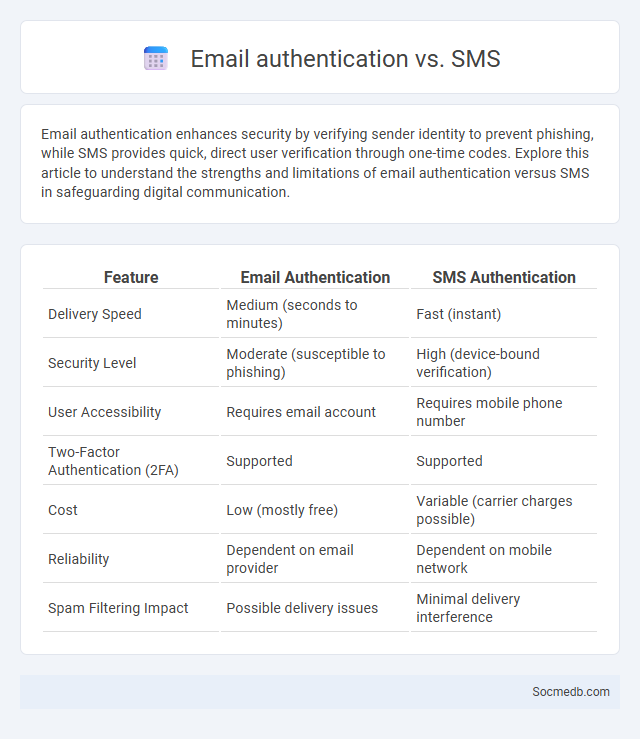
Photo illustration: Email Authentication vs SMS
Email authentication enhances security by verifying sender identity to prevent phishing, while SMS provides quick, direct user verification through one-time codes. Explore this article to understand the strengths and limitations of email authentication versus SMS in safeguarding digital communication.
Table of Comparison
| Feature | Email Authentication | SMS Authentication |
|---|---|---|
| Delivery Speed | Medium (seconds to minutes) | Fast (instant) |
| Security Level | Moderate (susceptible to phishing) | High (device-bound verification) |
| User Accessibility | Requires email account | Requires mobile phone number |
| Two-Factor Authentication (2FA) | Supported | Supported |
| Cost | Low (mostly free) | Variable (carrier charges possible) |
| Reliability | Dependent on email provider | Dependent on mobile network |
| Spam Filtering Impact | Possible delivery issues | Minimal delivery interference |
Understanding Email Authentication
Email authentication enhances the security of your social media communications by verifying the sender's identity and preventing phishing attacks. Key protocols like SPF, DKIM, and DMARC work together to authenticate emails, reducing the risk of fraudulent messages reaching your audience. Understanding these mechanisms helps protect your brand reputation and ensures your messages are trusted by recipients.
SMS Authentication: How It Works
SMS authentication verifies user identity by sending a unique one-time password (OTP) via text message to the registered mobile number during login. This method enhances security by ensuring that only the person with access to the verified phone can complete the authentication process. Widely implemented by social media platforms, SMS authentication helps prevent unauthorized access and protects accounts from cyber threats.
The Basics of Two-Factor Authentication (2FA)
Two-Factor Authentication (2FA) enhances social media security by requiring two forms of verification: your password and a secondary code, usually sent to your phone or generated by an authentication app. This extra layer significantly reduces the risk of unauthorized access to your social media accounts, even if your password is compromised. Enabling 2FA on platforms like Facebook, Instagram, and Twitter protects your personal information and prevents identity theft.
Security Strength: Email vs SMS vs 2FA
Security strength varies significantly between Email, SMS, and 2FA methods for social media protection. Email authentication can be vulnerable to phishing attacks, while SMS is susceptible to SIM swapping and interception, making both less secure. Implementing 2FA using authenticator apps or hardware tokens enhances your account security by requiring a second verification step beyond just email or SMS codes.
User Experience and Usability Comparison
Social media platforms prioritize user experience by integrating intuitive interfaces, fast load times, and personalized content algorithms that enhance engagement and satisfaction. Usability comparison reveals that apps like Instagram excel in visual content browsing with swipe gestures, while Twitter offers streamlined real-time updates through concise text feeds. Accessibility features such as voice commands, dark modes, and customizable settings significantly impact ease of use and user retention across platforms.
Vulnerabilities and Risks of Each Method
Social media platforms expose users to vulnerabilities such as data breaches, identity theft, and phishing attacks, which exploit personal information shared online. Each method of social media interaction--public posting, direct messaging, and profile customization--carries unique risks like unauthorized access, misinformation spread, and privacy invasion. Understanding these risks helps users implement stronger security measures like two-factor authentication and privacy settings to mitigate potential threats.
Implementation Challenges for Businesses
Implementing social media strategies poses significant challenges for businesses, including content creation consistency, audience engagement, and maintaining brand reputation across multiple platforms. Companies often struggle with measuring ROI accurately due to fluctuating algorithms and the dynamic nature of social networks like Facebook, Instagram, and TikTok. Security concerns such as data privacy, misinformation, and handling negative feedback further complicate successful social media management.
Cost and Resource Considerations
Social media marketing requires careful budgeting to balance ad spend, content creation, and platform management costs effectively. Businesses must allocate resources for skilled personnel, including community managers and content creators, to maintain consistent engagement and optimize campaign performance. Investing in analytics tools is essential to track ROI and adjust strategies, ensuring cost-effective use of marketing budgets.
Industry Best Practices and Recommendations
Industry best practices for social media emphasize consistent content scheduling, engagement with target audiences, and data-driven strategy adjustments. Utilizing analytics tools to monitor performance metrics like reach, engagement rate, and conversion helps optimize campaigns effectively. Recommendations include prioritizing authentic interactions, leveraging multimedia content, and adhering to platform-specific guidelines to maximize brand visibility and trust.
Choosing the Right Authentication Method for Your Needs
Selecting the appropriate authentication method for social media ensures maximum security and seamless user experience tailored to your specific needs. Two-factor authentication (2FA) and biometric verification are among the most effective methods, providing robust protection against unauthorized access. Evaluating your platform's user base and risk level helps determine whether SMS codes, authenticator apps, or hardware tokens best enhance your account security.
 socmedb.com
socmedb.com